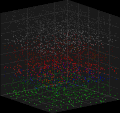User:Sturm/Tests
NeuroMat team
[edit]Antonio Galves is a Brazilian mathematician, professor of the Institute of Mathematics and Statistics of the University of São Paulo and member of the Brazilian Academy of Sciences. His field of studies is related to statistician issues models, in particular models that have stochasticity and variable range of memory. In 2007 he won the National Order of Scientific Merit. Professor Galves is also the leader of NeuroMat, a research center established in 2013 at the University of São Paulo that is dedicated to integrating mathematical modeling and theoretical neuroscience.
-
Antonio Galves
Foto 01 -
Ernesto Hamburger
Foto 02 -
Claudia D. Vargas
Foto 03 -
Antonio C. Roque
Foto 04 -
Antonio C. Roque
Foto 05 -
Fernando da Paixão
Foto 06 -
Eva Löcherbach
Foto 07 -
Pablo Ferrari
Foto 08 -
Jorge Stolfi
Foto 09 -
Bruno Monte de Castro
Foto 10 -
Christophe Pouzat
Foto 11 -
Ricardo Fraiman
Foto 12 -
Florencia Graciela Leonardi
Foto 13 -
Guilherme Ost and Aline Duarte
Foto 14 -
Markus Diesman
Foto 15 -
Wojciech Szpankowski
Foto 16 -
Leonardo G. Cohen
Foto 17 -
Noslen Hernandez Gonzalez
Foto 18 -
Fernando Najman
Foto 19 -
Ludmila Brochini
Foto 20
Scientific research
[edit]The mission of the Center is to develop the new mathematics needed to construct a Theory of the Brain accounting for the full experimental data gathered by neuroscience research. This calls for the development of a new approach —neuromathematics— conjoining probability theory, combinatorics, statistics, computer science and neuroscience. In this approach, a new class of mathematical models must be introduced to describe and explain in a parsimonious way the different scales of neural activity and their relationship. The construction of these models, however, should marry the simultaneous development of suitable statistical and computational methods, including model selection principles and results.
-
Scientific research
Foto 21 -
Scientific research
Foto 22 -
Scientific research
Foto 23 -
Miguel Abadi na lousa
Foto 24 -
Eva Löcherbach
Foto 25 -
Modelo Galves-Löcherbach
Foto 26
Scientific dissemination
[edit]The NeuroMat scientific dissemination team has been involved in media production in wiki frameworks —those related to the Wikimedia Foundation— and social media, especially through a NeuroMat page on Facebook. These media venues are part of what has been called “Web 2.0 services,” a set of sites that allow and encourage interaction and collaboration, thus potentially fostering the emergence of an active community around Neuromathematics and pertaining topics.
-
Scientific dissemination
Foto 27 -
Scientific dissemination
Foto 28 -
Scientific dissemination
Foto 29 -
Atividade de exposição
Foto 30 -
Foto de grupo das atividades de wiki difusão
Foto 31 -
Foto de grupo das atividades de wiki difusão
Foto 32 -
Dupla em atividades de wiki difusão
Foto 33
Technology transfer
[edit]NeuroMat’s technology-transfer activities have occurred in two fronts, according to the third report of activities: Neuro-rehabilitation and diagnosis, and Computational tools. The former is split into three main initiatives: Plasticity in brachial plexus avulsion (BPA), Psychosis and psychiatric illnesses and Plasticity in Parkinson’s disease (PD), respectively coordinated by Claudia D. Vargas, Sidarta Ribeiro, and Maria Elisa Piemonte. Computational tools included in the report: the Neuroscience Experiments System (NES), the Goalkeeper Game and the NeuroMat Open Database for neuroscientific data.
-
Goalkeeper Game and the NeuroMat Open Database for neuroscientific data
Foto 34 -
Goalkeeper Game and the NeuroMat Open Database for neuroscientific data
Foto 35 -
Goalkeeper Game and the NeuroMat Open Database for neuroscientific data
Foto 36 -
Plasticity in brachial plexus avulsion (BPA) team
Foto 37 -
Psychosis and psychiatric illnesses area coordinator
Foto 38 -
Plasticity in Parkinson’s disease (PD)
Foto 39 -
Plasticity in Parkinson’s disease (PD)
Foto 40







































